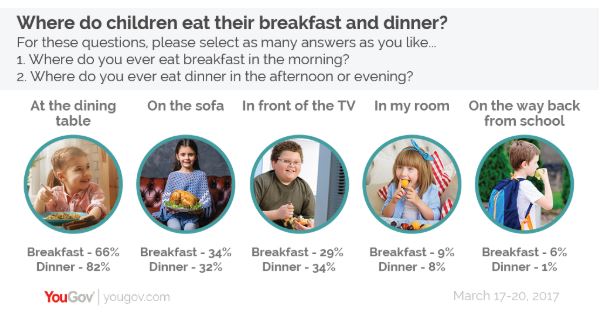From the ‘50s to the early ‘70s, the average family rarely, if ever, ate out. It was normal to have all hands on deck when it came to preparing the family dinner and to sit down together to eat without any interruptions. This was decades before the arrival of what’s now known as ‘the digital dinner table’ generation.
That’s right; no tablets or smartphones, no sitting in front of the TV, no games consoles and certainly no internet. Nowadays, we are so easily distracted during our ‘down time’ in the evenings, and it’s not just us as adults. More importantly, I’m talking about our little ones who, by the time they have come home from school, are sat in front of the TV, eyes glued to mobile and dinner on a tray.
Even without these distractions, we also have so much choice available to us on the high street that it’s easy to pick up a readymade snack on the way home from school or to call into a fast food restaurant instead. Everything is so readily available and cheap. It was in the early ‘70s that food giants such as McDonald’s opened their doors and now we are flooded by them.
The Mediterranean diet is often cited as one of the healthiest diets in the world but have we ever considered that it’s not just the food itself (olive oil, fish and vegetables) that impacts the longevity and quality of life? Part of it is down to the love and care that goes into the preparation. Then there’s the time allocated for sitting down with loved ones (think immediate family, cousins and friends) to talk and eat, and talk some more. Mealtimes last for at least two hours and there is a real sense of community, whereas the average dinnertime in the UK is only 21 minutes.
Meanwhile, back in the UK, recent research from YouGov’s Children’s Omnibus that surveyed 1,789 children, found that one in three (34%) eat their evening meal in front of the TV, whilst around three in ten (29%) do the same for breakfast. Although the research found that eight in ten (82%) do eat dinner at the table, it also discovered that youngsters become less sociable with their meals as they get older by eating in their bedroom.

The traditional practice of families eating good food around the table together, as in places like the Mediterranean, can be enormously beneficial for children. So, whilst traditional manners used to be about teaching kids not to talk with their mouths full, keeping elbows off the table and staying seated until everyone else was finished, it’s time to impart the new generation’s rules of switching off technology and sitting down together for at least 45 minutes to an hour. Here are the reasons why.
1. Family dinners lead to better relationships
Eating together helps build a closer relationship with your children and is an opportunity for everyone in the family to learn more about each other. For younger children, dinnertime conversation can boost vocabulary. Regular mealtimes mean you can connect and find out what’s going on at school, for example. Family dinners also lower the high-risk teenage behaviours that parents fear, such as smoking, binge drinking and eating disorders. Of course, sitting in stony silence or scolding kids at the table won’t lead to positive benefits but sharing a positive experience, joke or story are small moments that lead to building stronger connections.
2. Healthier food choices are made
Eating together as a family is associated with healthy dietary and nutritious patterns. Children are more likely to consume more vegetables and fruits and less fizzy drinks and fried foods, which means that with the correct eating habits in place, they are less likely to be overweight. Meals that are prepared at home are usually a lot healthier than meals eaten whilst dining out and it’s a great way to save money. It’s also an opportunity to expand your taste buds and have fun in the kitchen by making healthy versions of popular foods, such as pizza, by getting your kids involved too.
3. Improvement in academic performance
Studies have proven that family dinners significantly improve school grades. Teenagers who eat with their family four or more times a week also have higher academic performance. Researchers found that teens who have fewer than three family dinners in a typical week are more than twice as likely to do poorly in school. Talk around the dinner table can be encouraging, with children believing that their parents are proud of them.
4. Stronger mental health
Teenagers that eat with their parents regularly are more likely to be emotionally strong and have better mental health. Children are more likely to have good manners and better communication skills. It’s also a chance for your child to practice their social skills. It’s the perfect opportunity to build self-esteem as listening to your child shows that you value and respect who they are, what they do and how important they are to you.
5. Eating at home saves money
It’s cheaper to cook meals at home than to dine out. Home cooked meals cost two to four times less than those purchased in a restaurant. Planning a menu saves money so that when you go food shopping you will know exactly what to purchase. It’s a good idea to sit your family down and come up with a list of ten foods that everyone loves. You can keep the list to hand and find ways to mix and match so you don’t have to overspend. Frozen fruit and vegetables are great for making healthy family dinners on a budget.
These days, eating meals in front of the TV instead of around the table has become the social norm but the benefits suggest that it’s time to revert to traditional mealtimes. Eating together promotes more sensible eating habits, good mental wellbeing and gets you and your family into a loving routine that hopefully, your children will take with them when they fly the nest and will one day pass onto their own kids.








